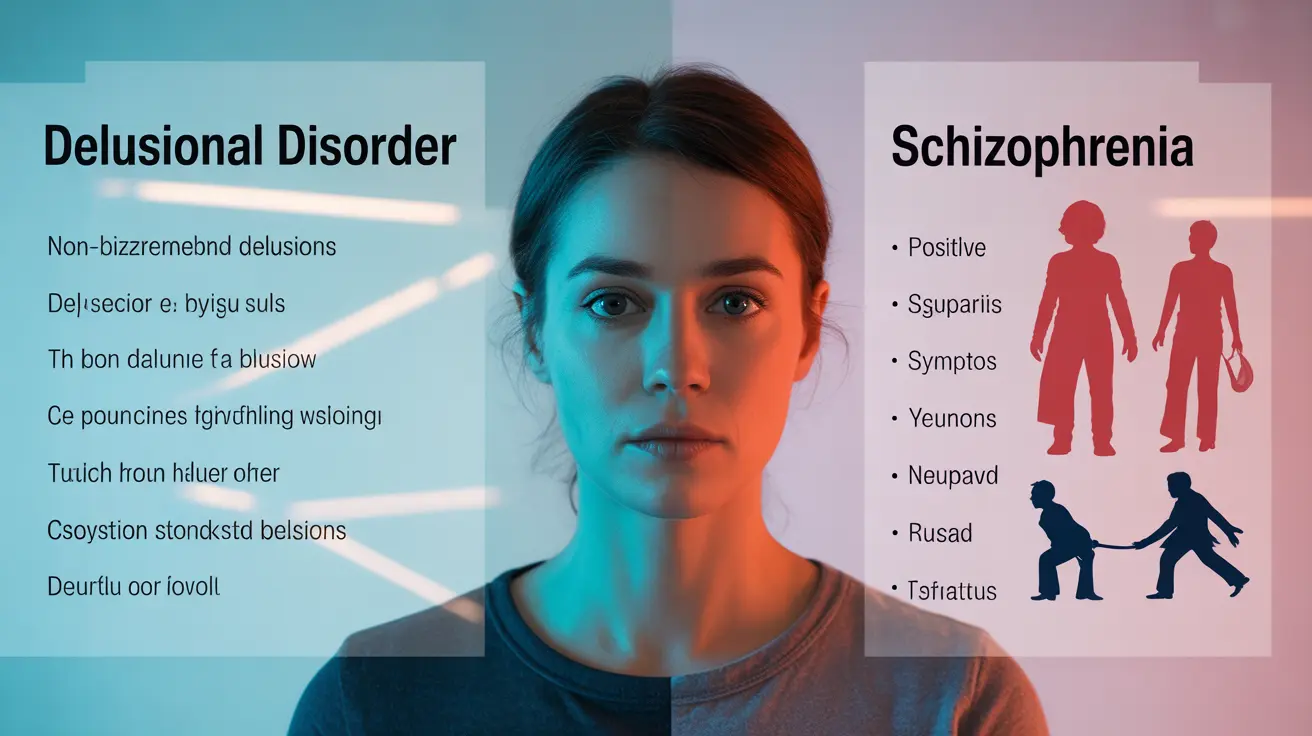Mental health conditions can be complex and sometimes difficult to distinguish, particularly when it comes to disorders that share certain symptoms. Delusional disorder and schizophrenia are two distinct psychiatric conditions that, while sharing some characteristics, have important differences in their presentation, impact, and treatment approaches.
Understanding these differences is crucial for proper diagnosis, treatment, and support of individuals affected by these conditions. This comprehensive guide explores the key distinctions between delusional disorder and schizophrenia, helping you better understand these complex mental health conditions.
Core Characteristics and Diagnostic Criteria
While both conditions involve disruptions in thought processes, they differ significantly in their overall presentation and impact on daily functioning. Delusional disorder primarily involves non-bizarre delusions, while schizophrenia typically presents with a broader range of symptoms affecting multiple aspects of mental functioning.
Delusional Disorder Characteristics
Delusional disorder is characterized by the presence of one or more non-bizarre delusions that persist for at least one month. These delusions often involve situations that could theoretically occur in real life, such as:
- Being followed or spied upon
- Having a serious illness
- Being cheated on by a partner
- Being conspired against
Importantly, individuals with delusional disorder often maintain relatively normal social functioning outside of their specific delusion-related behaviors.
Schizophrenia Characteristics
Schizophrenia presents with a more complex array of symptoms, including:
- Positive symptoms (hallucinations, delusions)
- Negative symptoms (reduced emotional expression, decreased motivation)
- Disorganized thinking and speech
- Impaired cognitive function
- Significant social and occupational dysfunction
Age of Onset and Development Patterns
The timing and pattern of symptom development differ notably between these conditions. Schizophrenia typically emerges in late teens or early twenties for men, and slightly later for women. Delusional disorder, however, tends to develop later in life, with an average age of onset in the 40s or later.
Impact on Daily Functioning
The impact these conditions have on daily life varies significantly. Individuals with delusional disorder often maintain better overall functioning, particularly in areas unrelated to their specific delusions. In contrast, schizophrenia typically has a more comprehensive impact on various aspects of daily living, including work, relationships, and self-care.
Treatment Approaches and Management
Treatment strategies differ between these conditions, reflecting their distinct characteristics and challenges:
Delusional Disorder Treatment
- Antipsychotic medications (often at lower doses)
- Cognitive behavioral therapy
- Supportive psychotherapy
- Focus on maintaining functional independence
Schizophrenia Treatment
- Higher doses of antipsychotic medications
- Comprehensive psychiatric care
- Psychosocial interventions
- Rehabilitation services
- Family education and support
Frequently Asked Questions
What are the main differences between delusional disorder and schizophrenia in terms of symptoms and impact on daily functioning? The main difference lies in symptom complexity and functional impact. Delusional disorder primarily involves non-bizarre delusions with relatively preserved functioning, while schizophrenia presents with multiple symptom types and more significant functional impairment.
How does the age of onset differ between delusional disorder and schizophrenia, and what does this mean for diagnosis? Schizophrenia typically develops in late teens or early twenties, while delusional disorder usually appears later in life, often in the 40s or later. This difference helps inform diagnostic considerations and treatment approaches.
What are the non-bizarre delusions typically associated with delusional disorder, and how do they differ from the delusions seen in schizophrenia? Non-bizarre delusions in delusional disorder involve situations that could theoretically occur, such as being followed or having an illness. Schizophrenia's delusions tend to be more bizarre and less grounded in possible reality.
How are delusional disorder and schizophrenia treated, and what are the most effective management strategies for each condition? Delusional disorder typically requires lower doses of antipsychotics and focused psychotherapy, while schizophrenia needs more intensive medication management, comprehensive psychiatric care, and psychosocial support.
Can a diagnosis of delusional disorder ever evolve into schizophrenia, and what factors influence this transition? While rare, some cases of delusional disorder may evolve into schizophrenia. Factors influencing this transition can include the emergence of additional psychotic symptoms, deteriorating functional ability, and changes in cognitive function.




